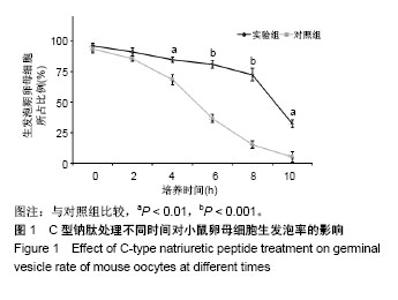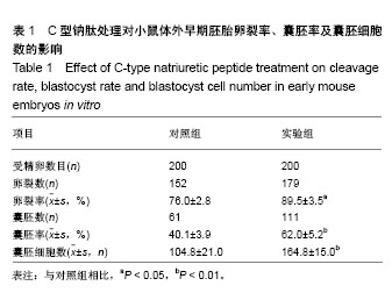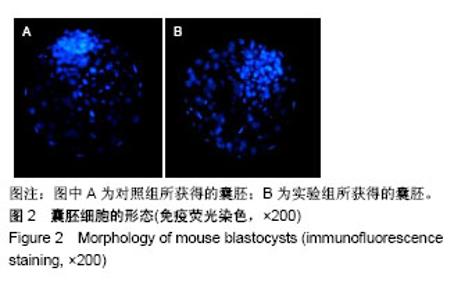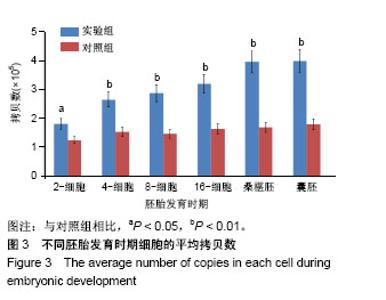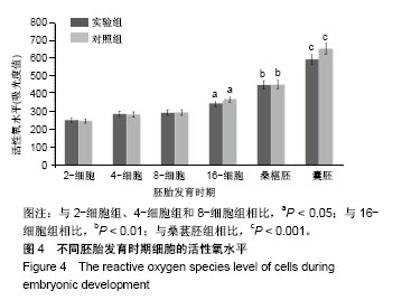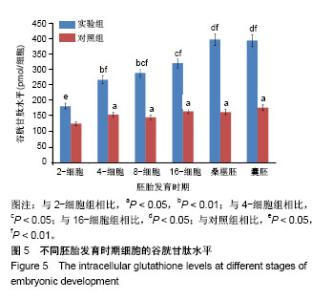| [1] 赵华,腾雪梅,郭娜,等.人类胚胎线粒体ATP、ROS水平与胚胎形态学分型的关系[J].华中科技大学学报(医学版), 2018,47(3): 314-317.[2] 邢雅欣,解其贵,杨志勇,等.HCG在小鼠卵母细胞体外受精胚胎发育过程中的作用[J].生殖医学杂志,2018,27(10):1000-1005.[3] Dinopoulou V, Drakakis P, Kefala S, et al. Effect of recombinant-LH and hCG in the absence of FSH on in vitro maturation (IVM) fertilization and early embryonic development of mouse germinal vesicle (GV)-stage oocytes. Reprod Biol. 2016;16(2):138-146.[4] 宋姝君.培养箱内温度和pH值对小鼠体外受精及胚胎发育的影响[D].唐山:华北理工大学,2016.[5] 郝大勇,王兴玲,杨晓娜,等.低氧环境对人类胚胎体外受精发育潜能和临床结局的影响[J].中国优生与遗传杂志, 2014,22(1): 93-94. [6] 辛志敏,张全乐,孙莹璞,等.早期低氧培养对体外受精-胚胎移植妊娠结局的影响[J].中国计划生育学杂志,2012,20(6):398-400. [7] Liu J, Van der Elst J, Van den Broecke R, et al. Live offspring by in vitro fertilization of oocytes from cryopreserved primordial mouse follicles after sequential in vivo transplantation and in vitro maturation. Biol Reprod. 2001; 64(1):171-178.[8] Del Campo MR, Donoso X, Parrish JJ, et al. Selection of follicles, preculture oocyte evaluation, and duration of culture for in vitro maturation of equine oocytes. Theriogenology. 1995;43(7):1141-1153.[9] 张春强, 欧阳效晴,张通,等.C型钠肽预处理对牛卵母细胞体外成熟的影响[J].畜牧兽医学报,2014,45(9):1424-1431.[10] Zhang M, Su YQ, Sugiura K, et al. Granulosa cell ligand NPPC and its receptor NPR2 maintain meiotic arrest in mouse oocytes. Science. 2010;330(6002):366-369. [11] Hiradate Y, Hoshino Y, Tanemura K, et al. C-type natriuretic peptide inhibits porcine oocyte meiotic resumption. Zygote. 2014;22(3):372-377. [12] Zhong Y, Lin J, Liu X, et al. C-Type natriuretic peptide maintains domestic cat oocytes in meiotic arrest. Reprod Fertil Dev. 2015. doi: 10.1071/RD14425. [13] Zhang J, Wei Q, Cai J, et al. Effect of C-Type Natriuretic Peptide on Maturation and Developmental Competence of Goat Oocytes Matured In Vitro. PLoS One. 2015;10(7): e0132318. [14] Sugimura S, Yamanouchi T, Palmerini MG, et al. Effect of pre-in vitro maturation with cAMP modulators on the acquisition of oocyte developmental competence in cattle. J Reprod Dev. 2018;64(3):233-241. [15] 周永娜.应用mtDNA和Y染色体基因片段解析梅花鹿种公鹿的母系及父系类型[D].北京:中国农业科学院,2018.[16] 周秀敏,杨永江,毕英杰,等.三个地方猪种线粒体COXⅠ基因SNPs筛选及序列分析[J].现代畜牧兽医,2017(7):10-15.[17] 马冬雪.小鼠早期胚胎内部活性氧水平与胚胎凋亡通路关系的研究[D].延吉:延边大学,2017.[18] 胡艳红,张凡,张楚焌,等.程序性细胞死亡形式研究进展[J]. 辽宁中医药大学学报,2018,20(12):85-89.[19] 郭长丽.小鼠体内外胚胎MET时期抗氧化酶表达的研究[D]. 延吉:延边大学,2017.[20] 梁琳,陈秀娟.观察体外受精中卵泡液的抗氧化能力及其对卵母细胞质量和胚胎发育的影响[J].生殖医学杂志, 2015,24(7): 532-537.[21] Sudoh T, Minamino N, Kangawa K, et al. C-type natriuretic peptide (CNP): a new member of natriuretic peptide family identified in porcine brain. Biochem Biophys Res Commun. 1990;168(2):863-870.[22] Santiquet NW, Greene AF, Becker J, et al. A pre-in vitro maturation medium containing cumulus oocyte complex ligand-receptor signaling molecules maintains meiotic arrest, supports the cumulus oocyte complex and improves oocyte developmental competence. Mol Hum Reprod. 2017;23(9): 594-606. [23] Xi G, An L, Jia Z, et al. Natriuretic peptide receptor 2 (NPR2) localized in bovine oocyte underlies a unique mechanism for C-type natriuretic peptide (CNP)-induced meiotic arrest. Theriogenology. 2018;106:198-209. [24] Koczor CA, Jiao Z, Fields E, et al. AZT-induced mitochondrial toxicity: an epigenetic paradigm for dysregulation of gene expression through mitochondrial oxidative stress. Physiol Genomics. 2015;47(10):447-454. [25] Zeng HT, Ren Z, Yeung WS, et al. Low mitochondrial DNA and ATP contents contribute to the absence of birefringent spindle imaged with PolScope in in vitro matured human oocytes. Hum Reprod. 2007;22(6):1681-1686. [26] May-Panloup P, Chretien MF, Malthiery Y, et al. Mitochondrial DNA in the oocyte and the developing embryo. Curr Top Dev Biol. 2007;77:51-83.[27] 韦启鹏.活性氧、FOXO3a与高浓度葡萄糖环下小鼠早期胚胎发育阻滞的相关性研究[D].郑州:郑州大学,2014.[28] Li L, Lu X, Dean J. The maternal to zygotic transition in mammals. Mol Aspects Med. 2013;34(5):919-938. [29] Li XY, Harrison MM, Villalta JE, et al. Establishment of regions of genomic activity during the Drosophila maternal to zygotic transition. Elife. 2014;3:e03737.[30] 井洋洋,方南洙,张宝修,等.活性氧对鼠早期胚胎抗氧化酶基因表达的影响[J]. 中国兽医学报,2017,37(2):335-344. [31] de Matos DG, Furnus CC. The importance of having high glutathione (GSH) level after bovine in vitro maturation on embryo development effect of beta-mercaptoethanol, cysteine and cystine. Theriogenology. 2000;53(3):761-771. |
